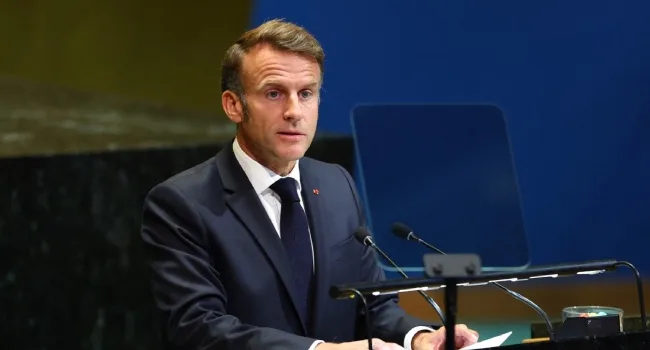French President Emmanuel Macron on Monday officially recognized a Palestinian state, a major diplomatic shift that led a wave of similar announcements by Western nations during a landmark UN summit co-hosted by France and Saudi Arabia.
“The time for peace has come, as we are just moments away from no longer being able to seize it,” Macron declared during the high-level summit in New York.
“The time has come to free the 48 hostages held by Hamas. The time has come to stop the war, the bombings of Gaza, the massacres and the displacement.”
Macron’s declaration adds France to a growing list of Western countries — including Australia, Britain, Canada, and Portugal — that have now recognized Palestinian statehood. While largely symbolic, the move increases pressure on Israel, which has continued its military offensive in Gaza following Hamas’s October 7, 2023, attack.
Earlier, Macron emphasized that the release of hostages held by Hamas would be a precondition for opening a formal French embassy in Palestine, a move that would elevate recognition beyond symbolism.
Israel, however, has fiercely opposed any unilateral recognition of Palestinian statehood. Far-right members of Prime Minister Benjamin Netanyahu’s government have floated the idea of annexing the West Bank, which would effectively make a two-state solution impossible.
Israel’s ambassador to the United Nations, Danny Danon, responded with fury.
“We will take action,” Danon warned. “It’s easier to come here and give speeches, take pictures, feel like they are doing something. But they are not promoting peace. They are supporting terrorism.”
US and Germany oppose recognition
The United States, Israel’s closest ally, had urged its partners not to proceed with recognition, insisting that statehood should come only through negotiations.
White House Press Secretary Karoline Leavitt said President Donald Trump viewed the recognition move as a “reward for Hamas.”
“Frankly, he believes it’s a reward to Hamas,” Leavitt told reporters. “These decisions are just more talk and not enough action from some of our friends and allies.”
Germany, despite adopting a more critical stance on Israel’s military actions in Gaza than the US, also refused to follow suit, emphasizing the need for a negotiated two-state solution.
“Only a negotiated two-state solution can allow Israelis and Palestinians to live in peace, security and dignity,” said German Foreign Minister Johann Wadephul.
More than 140 world leaders are attending the summit in New York, but Palestinian President Mahmoud Abbas was denied a US visa and is participating virtually. Meanwhile, Israel has announced it will skip an emergency UN Security Council meeting on Gaza scheduled for Tuesday, citing observance of the Jewish New Year.
Back in Israel, Netanyahu has doubled down on his opposition to Palestinian statehood, vowing to accelerate settlement construction. Two of his far-right ministers — Itamar Ben Gvir and Bezalel Smotrich — have openly called for the annexation of the West Bank.
Despite threats of retaliation, UN Secretary-General Antonio Guterres told AFP: “We should not feel intimidated by the risk of retaliation.”
Macron’s exasperation and global reaction
Macron’s move comes amid growing global frustration over Israel’s prolonged military campaign, which has led to massive civilian casualties and humanitarian catastrophe in Gaza. Analysts say Macron’s recognition reflects a shift in Europe’s political calculus.
Britain, which historically supported the creation of a Jewish homeland through the 1917 Balfour Declaration, hinted it could reconsider recognition if Israel agreed to a ceasefire.
However, some experts warn the gestures, while historic, may have limited impact on the ground unless backed by real diplomatic pressure.
“Unless backed up by concrete measures, recognizing Palestine as a state risks becoming a distraction from the reality — which is an accelerating erasure of Palestinian life in their homeland,” said Max Rodenbeck, Israel-Palestine project director at the International Crisis Group.
The war was triggered by Hamas’s October 7 attack, which killed 1,219 Israelis, mostly civilians, according to official Israeli figures.
Since then, Israeli operations in Gaza have resulted in 65,062 Palestinian deaths, according to the Hamas-run Health Ministry, figures that the UN considers broadly credible. The majority of the casualties are reported to be civilians.


